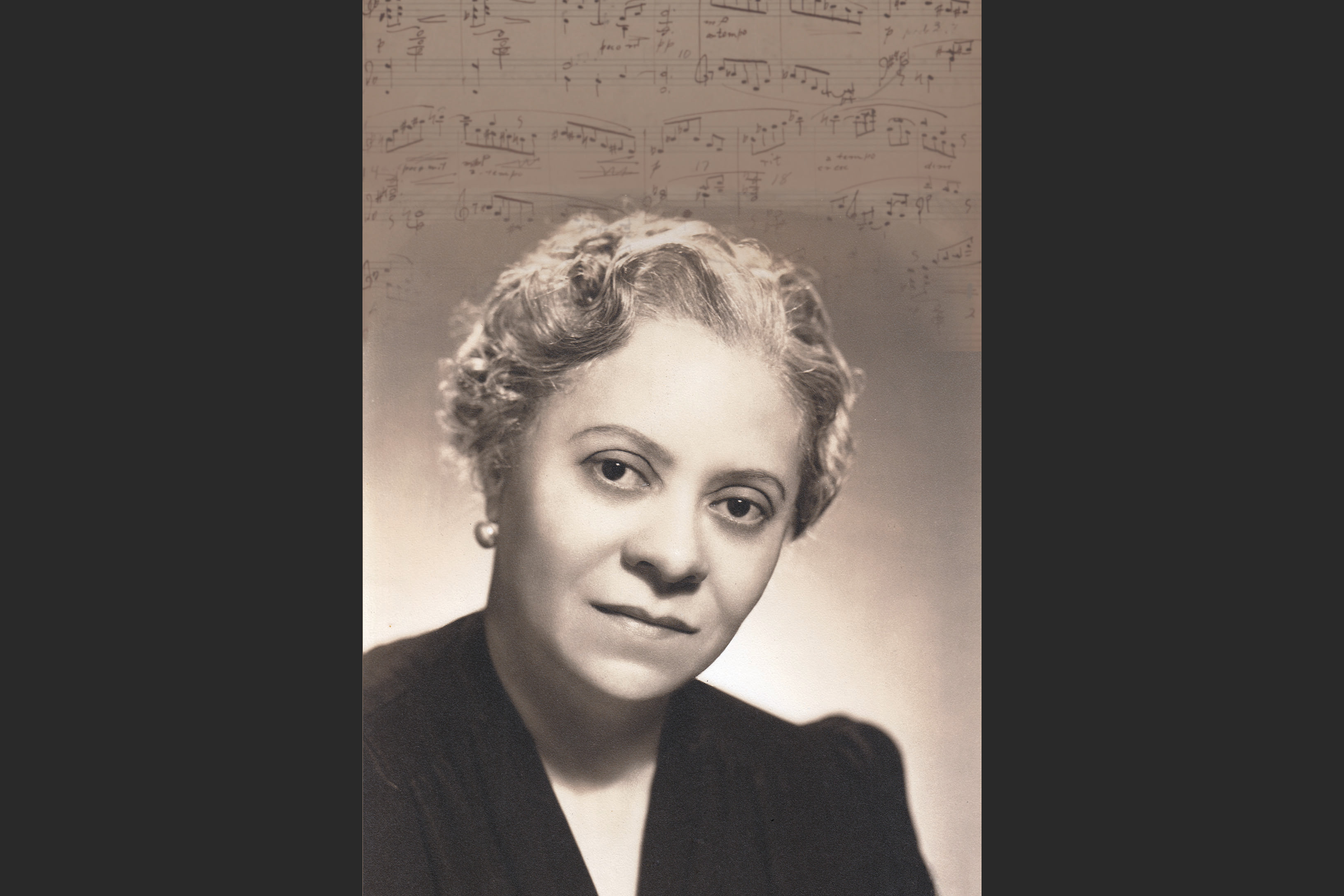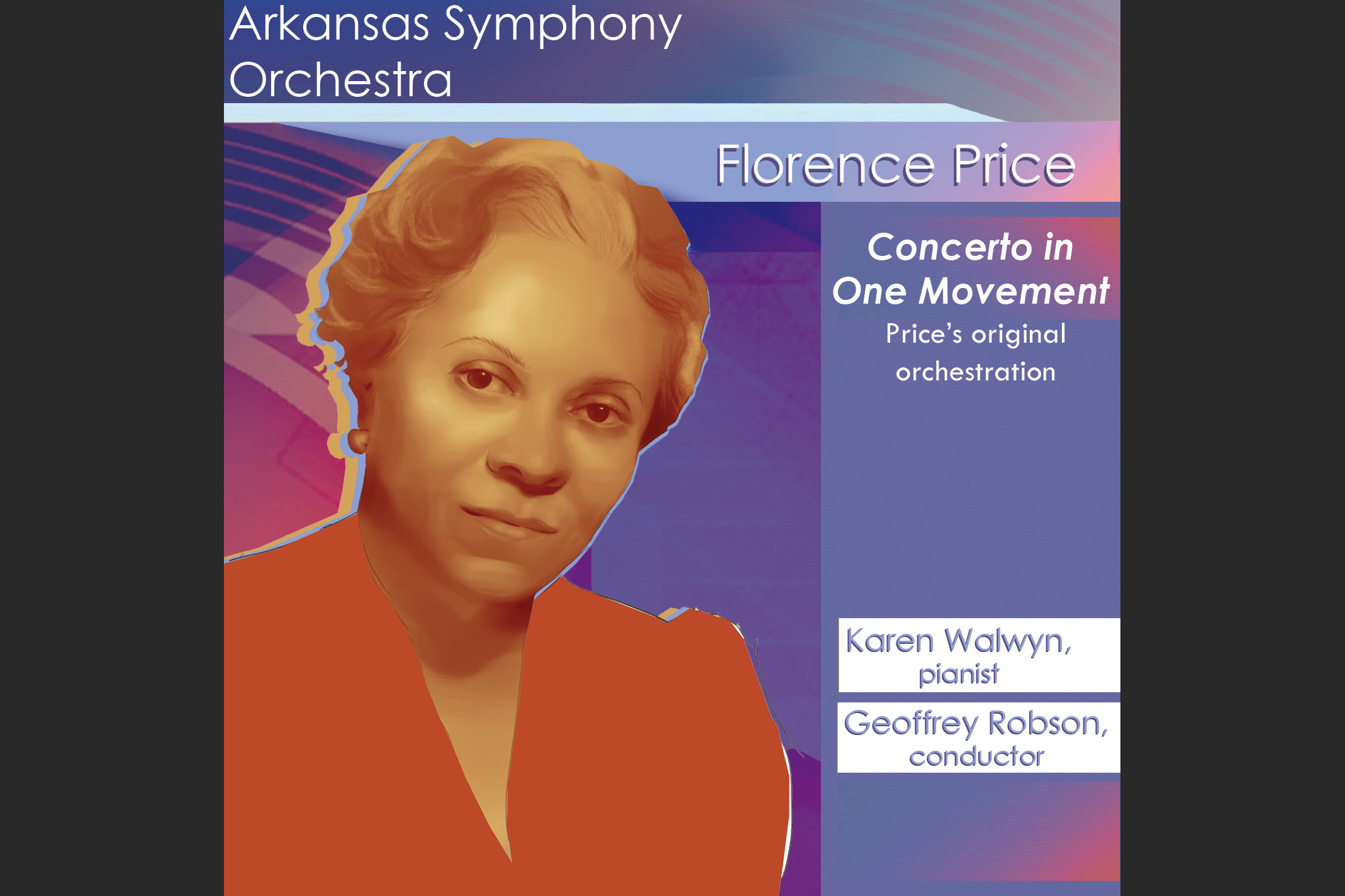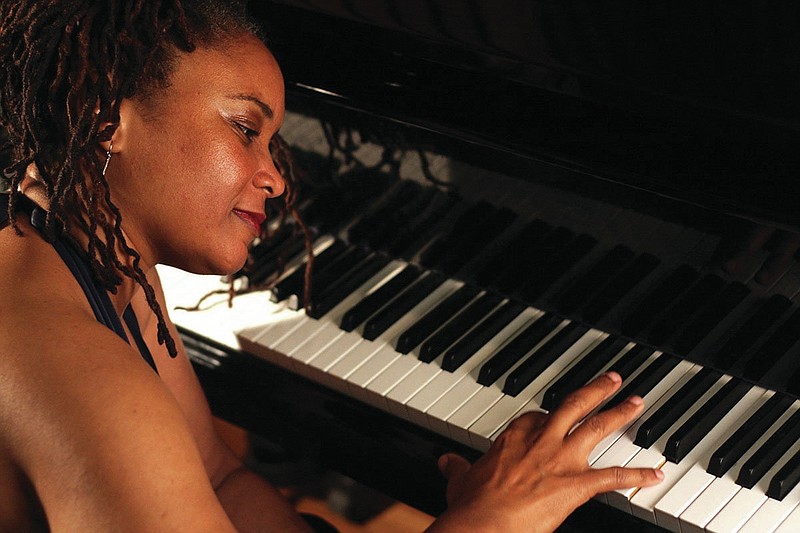On Sept. 16, concert pianist, composer and recording artist Karen Walwyn joined the Arkansas Symphony Orchestra and conductor Geoffrey Robson in Little Rock's Robinson Center Performance Hall to play the world premiere of composer Florence Price's own orchestration of her 1934 "Piano Concerto in One Movement."
The free community concert was a thank-you to patrons who had stuck with the orchestra during the pandemic and, according to a news release, "celebrated the Little Rock community's diverse musical traditions."
The next day, the musicians re-assembled at Robinson Center Performance Hall to record the piece, in two three-hour sessions.
The recording is now available, though not yet in "hard" form. You can find it on at least three streaming systems — Amazon Music, YouTube Music and Spotify — with more, orchestra officials assure, to follow.
The release is timed to almost coincide with Price's birthday. Born in Little Rock April 9, 1887, she'd be 135 this year. She died June 3, 1953, in Chicago.
"We had talked about it when I first came to play with the [Arkansas] Symphony in 2019," says Walwyn, who soloed in the previous version of the concerto with the orchestra in a pair of November "Beethoven and Blue Jeans" concerts.
The Price orchestration, however, hadn't yet been uncovered. "I was not told who turned it in," Walwyn adds. "It had been in someone's basement; they realized what they had and brought it to [music publisher] Schirmer."
And because Little Rock was Price's birthplace, "I realized the Arkansas Symphony needed to be the orchestra to have it."
 Because Florence Price was born in Little Rock (in 1887), pianist Karen Walwyn was determined that the Arkansas Symphony premiere the composer’s own orchestration of her “Piano Concerto in One Movement.” (Democrat-Gazette file photo)
Because Florence Price was born in Little Rock (in 1887), pianist Karen Walwyn was determined that the Arkansas Symphony premiere the composer’s own orchestration of her “Piano Concerto in One Movement.” (Democrat-Gazette file photo)
FIRST ENCOUNTER
Walwyn, a New York native, area coordinator of keyboard studies at Washington's Howard University, a winner of the Steinway Artist Award (the first Black woman to receive it) and a champion of Price's solo piano literature, first encountered the concerto — and Price — in 2010, when the Center for Black Music Research approached her to take a look at it.
"I didn't really know anything about her," she says.
At the time, the solo piano part was the same but the only performing version was in an orchestration that Trevor Weston derived from Price's hand-written two-piano score after the original orchestra score was lost. (It's common, even usual, Walwyn says, for composers to reduce concerto scores for piano solo and piano accompaniment since very few pianists have a full orchestra at their disposal when preparing a piece for performance.)
"It's really fascinating to realize how much work Trevor did," she says. "How beautifully he created the score. It's not too different from a lot of the larger portions of the concerto, and I give him a lot of credit."
She also created the premiere recording of the concerto in that version in 2010 for Albany Records, paired with Price's "Symphony in e minor." That's the work that briefly made Price, who had studied organ performance and composition at the New England Conservatory of Music, successful in the 1930s after its premiere by the Chicago Symphony.
Price eventually settled in the Windy City, writing symphonies, concertos, choral works and pieces for piano and solo voice and piano. But because she was a Black woman, and because she was writing melodic, neo-Romantic works at a time when composers were experimenting with alternate tonalities, she wasn't able to break through again into the top ranks of American music.
A few of Price's compositions continued to show up in the repertoire over the years, but until a vast trove of works was rediscovered in the attic of a Chicago house where she had resided, years after her death, she remained relatively obscure.
No longer. The Arkansas Symphony is only one of many musical institutions that has been programming Price pieces, which have been almost exploding across the musical landscape. The Philadelphia Orchestra, for example, recently released a recording on the prestigious Deutsche Grammophone label, no less, of two of Price's four symphonies. (The only previous recordings in the catalog had been by the Fort Smith Symphony and conductor John Jeter.)
Three or four years after she recorded the concerto in 2010, she got a request from James Greeson, now an emeritus faculty member at the University of Arkansas at Fayetteville, who "suggested that I learn these pieces that had just become available for his documentary [about Price], 'The Caged Bird.'" The 2015 documentary, available from the University of Arkansas Press, received an Emmy nomination.
PRICE SCHOLARSHIP
That spurred Walwyn, who styles herself as a Florence Price scholar, to know more.
"I traveled to Little Rock to see where she was from," she says, with a stop in Harrison "after hearing a city commissioner discussing the continuing influence [there] of the Ku Klux Klan. I wanted to know what's life like there today, surrounded by the KKK, a lot like what life might have been like for Florence Price in the early part of the 20th century." She also made a visit to Fayetteville.
In Little Rock, she visited Shorter College, where Price had taught, "to put my feet where she walked." After that, "I drove straight to Chicago, among other things, to visit her grave, which is still without a headstone."
The house in Chicago where Price had lived had been demolished, but she was able to visit the site. She audibly shakes her head as she recalls the musical treasure that was found there, and what a miracle it was that so much of it survived what had been unkind treatment at best.
"Music had been scattered on the floor," she says. "[Some of it] had been stored outdoors on a patio. It's just a tremendous gift."
 There’s no actual album for the Arkansas Symphony recording of Florence Price’s “Piano Concerto in One Movement,” but there is an album cover. (Special to the Democrat-Gazette)
There’s no actual album for the Arkansas Symphony recording of Florence Price’s “Piano Concerto in One Movement,” but there is an album cover. (Special to the Democrat-Gazette)
RECORDING SESSIONS
What are the big changes between Weston's orchestration of the piano concerto and Price's?
Most of the differences occur in the second "movement," Walwyn says — the piece is in three segments but played in one continuous movement, as the title says — including "a huge oboe solo; sometimes it's just [the pianist] and the oboe," something Weston couldn't possibly have inferred from the piano rehearsal score.
"It's quite a beautiful color, some very, very intimate moments," in contrast with the "huge, gargantuan ending of the first 'movement,'" she says.
Walwyn got to examine the piece even more closely as she had to make changes to several aspects of her playing for the "very challenging" daylong recording sessions with the Arkansas Symphony.
"Recording was very different from performing it live," she explains. "You have to adjust in many ways. There are certain things you can't do on a recording. I chose to phrase certain lines — in performance you hear the top notes of an arpeggio, it travels all the way to the back to the audience, but in a recording, it sounds like you've brought an axe to the piano.
"Voicing, especially in the top notes of thicker chords, comes out more on the recording. And it's much harder to capture the excitement and delicacy in a recording" — akin, she suggests, to "sitting in the audience blindfolded."
"It was an amazing opportunity for me to grow. I feel much more comfortable with the piece; this gave me the kind of detailed time I would never have had, and an in-depth look at what's going on with the orchestra as well."
Robson says all involved in the recording experience "were all really excited" about it.
"We were able to discover Florence Price's distinct voice in her music," he says. "We're looking forward to helping reassemble her life's work."
[RELATED: ASO’s ex-music director has new recording of his own]
Watching the performance
Where you can stream the Arkansas Symphony/Karen Walwyn recording of Florence Price’s Piano “Concerto in One Movement”:
◼️ Amazon Music (listen free if you’re a member; buy for $2.97): amazon.com/music/player/albums/B09VLM8Q4F?ref=sr_1_2&keywords=Florence+Price%3A+Concerto+in+One+Movement&crid=3CA2504TZUVGR&sprefix=florence+price+concerto+in+one+movement+%2Caps%2C174&qid=1647543150&sr=8-2
◼️ YouTube Music: music.youtube.com/watch?v=lZpemt3PlIQ&list=RDAMVMlZpemt3PlIQ
◼️ Spotify: open.spotify.com/album/0Ar4q7eyrznAvlh7G719hO?si=173fujMeQaCYocaE6895Ag&nd=1
